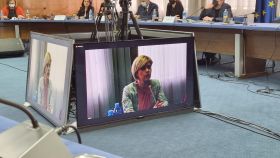Statement to Joint Committee on Disability Matters
Date of article: 16/12/2021
Daily News of: 17/12/2021
Country:  Ireland
Ireland
Author: National Ombudsman of Ireland
Article language: en
Opening Statement from the Ombudsman, Mr Peter Tyndall, on “Grounded: unequal access for people with disabilities to personal transport schemes”
Cathaoirleach and members of the Committee, thank you for the invitation to come here today to discuss my recently published commentary report titled “Grounded: unequal access for people with disabilities to personal transport schemes”.
I had the opportunity of meeting this Committee in June of this year to discuss the Wasted Lives report, which as you are aware was in relation to the inappropriate placement of people under 65 in nursing homes. I was delighted at the coverage this report received and the opportunity it gave me to highlight the serious and systemic issues that unfairly impacted, and continue to impact on, people under 65 living with a disability in nursing homes. I had thought that would be my last appearance with this Committee before I finished my tenure as Ombudsman. However, I am happy that this did not prove to be the case. I am glad to have the opportunity to discuss the issue of unequal access to personal transport supports for people living with a disability.
UNCRPD
As Committee members will know, the ratification of the United Nations Convention on the Rights of Persons with Disabilities (UNCRPD) in 2017 provided a legal basis for people with disabilities to have the right to live independently and participate fully in all aspects of life. Lack of access to transport is one of the key barriers to stopping the realisation of these fundamental rights and can lead to the further economic, social, and personal isolation of people living with a disability. The opposite is also true and access to transport for many people can be an equaliser, changing the lives of persons with disabilities for the better.
Article 9 of the UNCRPD is focused on accessibility and puts an onus on signatures to provide equal access to transportation to people living with a disability in order to support them to participate equally in daily life, for example, to access further education, gain employment, be involved in their community or participate in social activities and hobbies.
In Ireland the National Disability Inclusion Strategy 2017-2021 sets the overall framework for the equal participation of people with disabilities in society. Under the Strategy, the Department of Transport, Tourism and Sport has responsibility for the continued development and availability of accessible public transport. I warmly welcome all the necessary work that has been undertaken in this area. However, in my opinion this, by itself, it not enough to meet our commitments under the UNCRPD.
For some people living with a disability, public transport may not be the most appropriate or even a possible mode of daily transport. For example, the inadequacy of access to some public transport facilities such as the DART, is a matter of great concern to disabled people who use it. Many journeys on public transport also require the use of different services which means that any problem occurring with one of the services, makes the whole journey impossible. Fear of personal safety on public transport is also an issue for some.
Therefore, while improving access to public transport is an important issue in its own right, it is unreasonable to suggest that it can address the transport needs of many disabled people, who may live in rural areas, or struggle to get to bus stops or stations. In such circumstances a car provides optimum mobility for many people living with a disability who see it as the key to their quality of life. However, often they may need to be supported to access their own personal transport whether that be through an adapted car for themselves to drive or within their household as a passenger.
(...)



